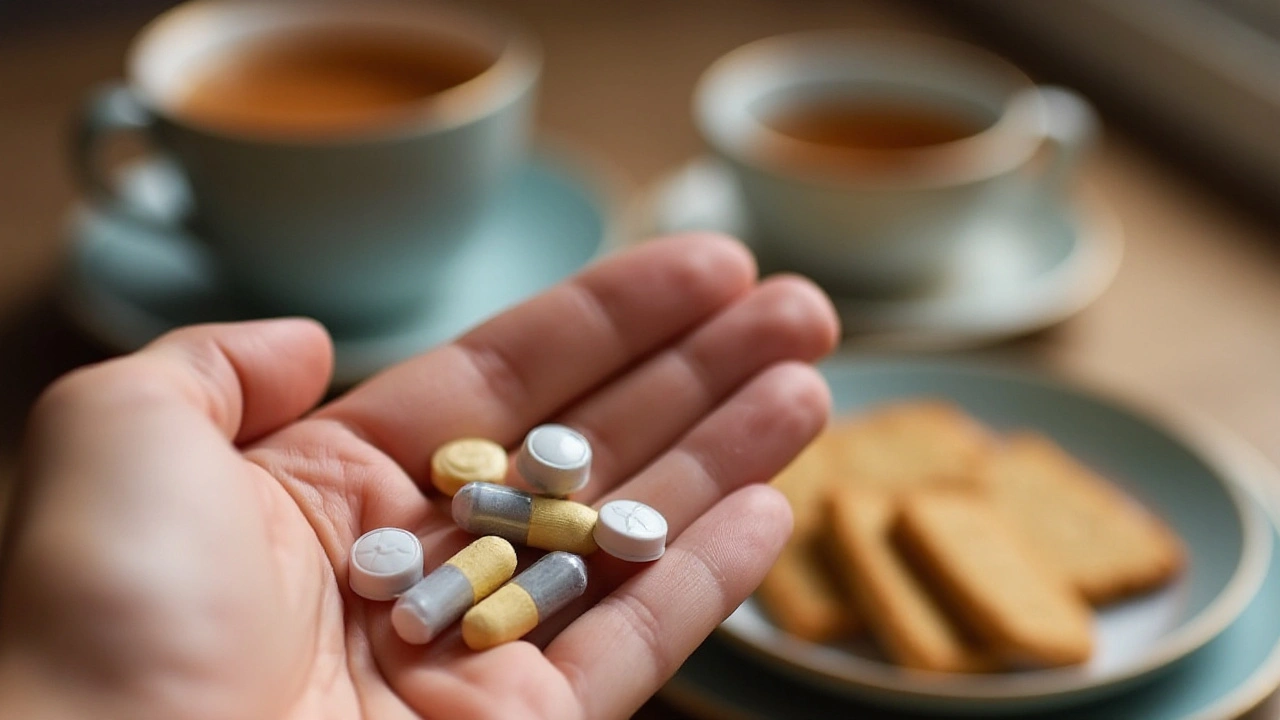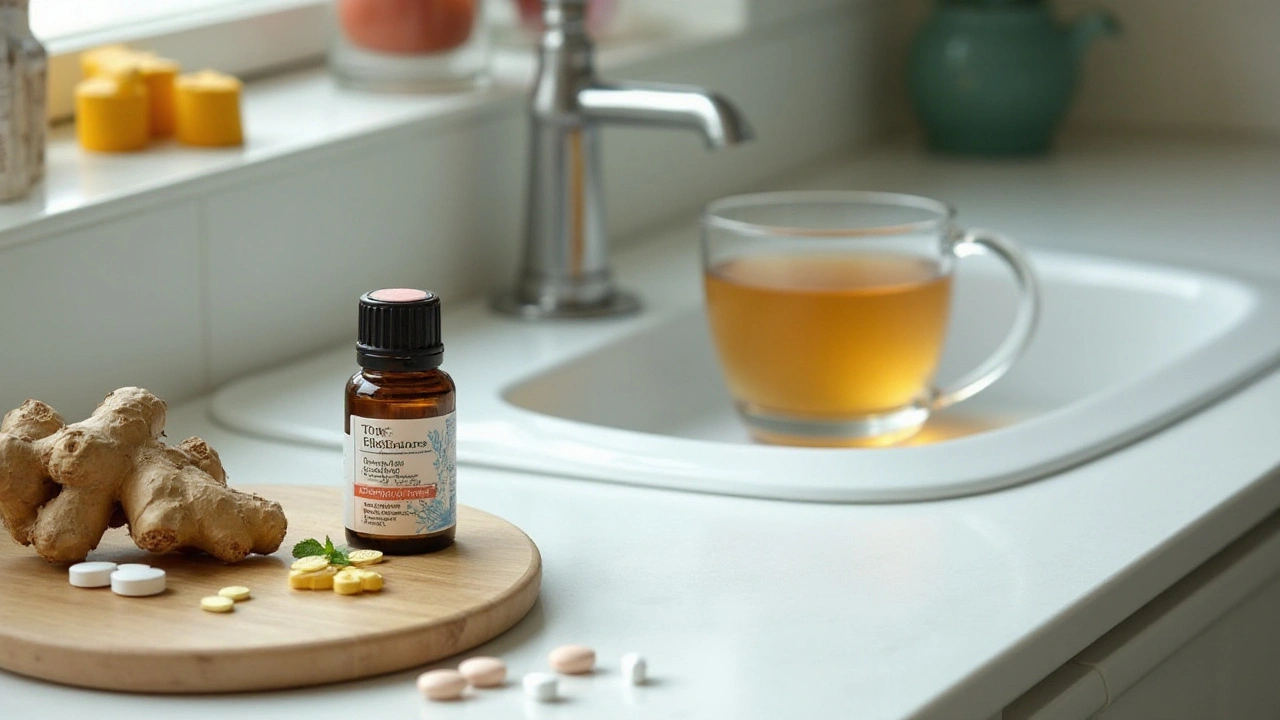Feeling bloated after a meal can be an uncomfortable experience. An often overlooked factor is the role medications play in causing this issue. Whether over-the-counter or prescription, various drugs can influence how your digestive system functions.
Understanding how certain medications impact digestion is crucial. Some drugs slow down the digestive process, while others may trigger gas and bloating as side effects. By identifying which medications are the culprits, you can take steps to mitigate these effects.
In this article, we'll explore common medications that lead to post-meal bloating, understand their mechanisms, and provide practical tips to manage and alleviate the discomfort.
- Common Medications That Cause Bloating
- How Drugs Affect Digestive Health
- Managing and Reducing Bloating
- Practical Tips for Better Digestive Health
Common Medications That Cause Bloating
Bloating can be more than just a minor inconvenience. For many, it’s a regular part of life triggered by medications they rely on for managing different health conditions. Various drugs are known to cause bloating, and knowing which ones can help you take proactive steps to mitigate this side effect.
Antibiotics are a common group of medications that can lead to bloating. They disrupt the natural balance of bacteria in your gut, which can result in gas and bloating. This disruption occurs because antibiotics don’t exclusively target harmful bacteria; they also kill off the good bacteria that help digestion.
Pain relievers, especially those in the NSAID (nonsteroidal anti-inflammatory drugs) category, such as ibuprofen and aspirin, can influence your digestive health. These medications can irritate the lining of the stomach and intestines, potentially slowing down digestion and leading to bloating.
Some antidepressants, like SSRIs (selective serotonin reuptake inhibitors), are also culprits. They can slow down the digestive process, causing food to move more slowly through the gastrointestinal tract and resulting in bloating. This side effect may not be well-known, but it’s significant for those who need these medications for mental health.
Steroid medications, commonly used to treat inflammatory conditions such as arthritis, can cause bloating due to fluid retention. Steroids can increase the retention of water and salt in the body, which leads to bloating, especially in the abdominal area.
Medication for managing diabetes can also cause bloating. For instance, metformin is known to cause gastrointestinal symptoms, including bloating. It’s an essential medication for many, so managing its side effects becomes crucial.
Iron supplements, often prescribed to treat anemia, can cause a range of digestive issues, including bloating. They can be harsh on the stomach, leading to constipation and bloating.
In a 2020 study published in the Journal of the American Medical Association, it was found that nearly 30% of patients experienced increased bloating due to their medication regimen.
"Patients often overlook medication side effects, but awareness is the first step toward better management," said Dr. John Smith, a leading gastroenterologist.The impact of medications on digestive health is significant and often underestimated.
If you find yourself experiencing bloating frequently after starting a new medication, it’s essential to consult your doctor. They can help determine if your medication is the cause and may offer alternatives or additional treatments to alleviate your symptoms. Sometimes, simply adjusting the dosage or changing the time you take the medication can make a big difference.

How Drugs Affect Digestive Health
Medications can have a significant impact on digestive health and the way our bodies process food. Many people are unaware that their prescribed or over-the-counter drugs could be a source of post-meal bloating. Understanding the interaction between drugs and the digestive system can help individuals better manage these side effects.
One of the most common ways medications influence digestion is by altering gut motility. Some drugs slow down the movement of food through the digestive tract, leading to symptoms like bloating, gas, and constipation. For instance, opiates and certain antidepressants are known to have this effect. When the digestive system slows, food remains in the gut for an extended period, allowing more time for gas production.
Another factor is the role of medications in altering the gut flora. Antibiotics, while effective in killing harmful bacteria, also disrupt the balance of beneficial microbes in the stomach. This imbalance can lead to digestive issues including bloating. Restoring the balance with probiotics can sometimes help mitigate these side effects.
Certain medications also affect the chemical environment of the gastrointestinal tract. Proton pump inhibitors (PPIs), used to treat acid reflux, reduce stomach acid production. While this can relieve heartburn, it might also interfere with food digestion and absorption, causing bloating and discomfort.
Corticosteroids, often prescribed for inflammation, can also contribute to bloating. These drugs can lead to fluid retention and alter metabolism, presenting as digestive discomfort. People prone to digestive issues should be cautious when on long-term steroid usage.
Bloating is also a common side effect of metformin, a medication used for diabetes. Metformin can increase gas production and alter bowel movements, making it challenging for some patients to stay comfortable post-meal. Adjusting the dosage or switching to an extended-release form can sometimes alleviate these symptoms.
It's essential to discuss any persistent digestive issues with a healthcare provider. They may adjust medication dosages or suggest alternatives that are less likely to cause digestive problems. Making dietary changes or incorporating regular exercise can also help manage some of these side effects.
"Many common medications can slow gut motility, increase gas production, and disturb the delicate balance of your microbiome," says Dr. Jane Smith, a gastroenterologist at General Hospital.
Working closely with healthcare providers can lead to a better understanding and management of digestion-related side effects. They can offer tests to pinpoint the exact cause and tailor a strategy to reduce discomfort. Addressing these issues promptly can significantly improve one's quality of life and overall well-being.

Managing and Reducing Bloating
Managing and reducing bloating involves a combination of lifestyle changes, dietary adjustments, and thoughtful medication use. It's essential to identify the specific cause of your bloating to adopt the most effective strategies. If you're taking medications that contribute to this discomfort, speaking with your doctor is a good first step. Your doctor can help you adjust the dosage, switch to a different drug, or suggest the best time to take your medication to minimize bloating.
One of the most effective ways to tackle bloating is through dietary changes. Eating smaller meals more frequently can help reduce the amount of air swallowed during meals, which in turn can lessen bloating. Many people find that limiting foods like beans, lentils, and carbonated drinks helps as well. These foods are known to produce gas and can exacerbate the feeling of being bloated.
Stay Hydrated
Staying hydrated is another crucial element. Drinking plenty of water aids in digestion and keeps things moving smoothly through your digestive tract. Sometimes dehydration can cause the stomach to hold onto more water, worsening the sensation of bloating. It's a good idea to drink a glass of water before meals but limit liquids during meals to prevent diluting digestive enzymes.
Exercise and Movement
Exercise is also a powerful tool in reducing bloating. A simple walk after meals can keep your digestive system working efficiently. Physical activity helps stimulate metabolism and aids in moving gas through your digestive system more quickly. For those who experience regular bloating, engaging in regular physical activity can make a significant difference.
Consider Probiotics
Probiotics are another helpful addition to your anti-bloating arsenal. Probiotics are “good” bacteria that live in your gut and assist in breaking down food. Adding these beneficial bacteria through supplements or probiotic-rich foods like yogurt can help balance your digestive system and reduce bloating.
According to the American Gastroenterological Association, “Probiotics can be a helpful remedy for those suffering from digestive issues, as they help to balance the gut flora.”
Over-the-Counter Remedies
Over-the-counter remedies such as anti-gas medications can also provide relief. Medications containing simethicone can break down gas bubbles in your stomach, offering quick relief from bloating. Herbal remedies like peppermint oil have also been found to reduce symptoms of bloating and improve overall digestive function. However, it’s crucial to consult with a healthcare provider before starting any new medication or supplement, especially if you are already taking prescription drugs.
By combining these approaches, many people find significant relief from bloating after meals. The key is to be vigilant and proactive about what's causing your bloating and take steps to manage it effectively. Keep a food diary to track which foods and medications impact you the most, and always consult with healthcare professionals for tailored advice. This way, you can enjoy your meals without the uncomfortable aftermath.

Practical Tips for Better Digestive Health
Addressing bloating can significantly improve your quality of life. Several practical measures can help mitigate the discomfort associated with bloating, especially if medications are the main culprits. Start by reviewing your diet. Consuming fiber-rich foods can promote a healthy digestive system; foods like fruits, vegetables, and whole grains should be a staple in your meals. These foods help in pushing food through your intestines more effectively, reducing buildup that can cause bloating.
Chewing your food thoroughly can make a big difference too. When food is properly broken down, your stomach and intestines have less work to do, leading to fewer digestive issues. Slow down while eating and savor each bite. This habit not only aids digestion but can also help you enjoy your meal more.
Staying hydrated can't be overstated. Water aids in digestion, helping to break down food so that your body can absorb the nutrients. Aim for at least eight glasses of water a day, and try to drink between meals rather than during them to aid digestion.
Regular exercise is another crucial component. Physical activity helps stimulate the passage of gas through the digestive tract, which can reduce bloating. A daily walk or moderate-intensity workout can make all the difference. Make this a part of your routine.
Monitoring how your body reacts to different foods and medications is another effective approach. Keep a food diary, noting how you feel after consuming certain foods and after taking medications. Discuss these observations with your healthcare provider; this information can be invaluable in finding the right balance in your diet and medication regimen.
Some people find relief from bloating through the use of probiotics. These beneficial bacteria assist in maintaining a healthy gut flora, which is key for digestive health. You can find probiotics in foods like yogurt or in supplements. Consult with your healthcare provider to determine the best option for you. Avoiding carbonated drinks and artificial sweeteners can also help. These are known to cause bloating and gas, which only adds to the discomfort.
If you are on long-term medication that impacts your digestive health, talk to your doctor about alternatives. There might be another drug available that is easier on your stomach. Never discontinue medication without consulting your healthcare provider first.
“Listening to your body is key. Each person's digestive system reacts differently to foods and medications,” says Dr. Maria Gonzalez, a gastroenterologist at Health Central.Above all, remember that small changes can lead to big improvements. By incorporating these tips into your life, you can enhance your digestive health and reduce bloating.


Graham Holborn
Hi, I'm Caspian Osterholm, a pharmaceutical expert with a passion for writing about medication and diseases. Through years of experience in the industry, I've developed a comprehensive understanding of various medications and their impact on health. I enjoy researching and sharing my knowledge with others, aiming to inform and educate people on the importance of pharmaceuticals in managing and treating different health conditions. My ultimate goal is to help people make informed decisions about their health and well-being.